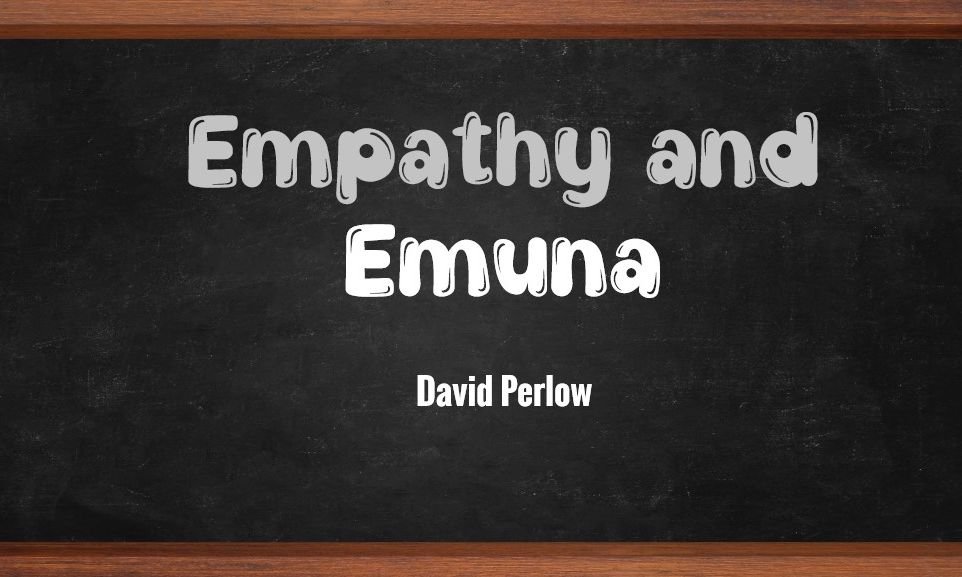
Empathy and Emuna
This student was unpredictable and I never knew how the class was going to go with him inside. Sometimes his behavior was like dealing with another thirty students…

His mother died when he was only 8. He was now 15, erratic, and at the same time brilliant. Handsome, funny and a real star, he could produce excellent work, but only if he scored a few goals in soccer earlier that day. This student was unpredictable and I never knew how the class was going to go with him inside. Sometimes his behavior was like dealing with another thirty students.
The month of his mother’s death approached, and he was extremely difficult to handle. Although I had a real desire for the class to keep moving ahead, I couldn’t focus because of him. He looked like he hadn’t slept for days.
On one particular occasion, I noticed him really down and spaced out. Intuitively I knew what I had to do, but knew it was unconventional. I gave the class an assignment that would be helpful for them but also take most of the class. I gave it a due date by the end of the hour. After that I asked the student to come outside. We walked out of the school to the bottom floor where there was a snack bar for the nearby workers. I bought us some candies and a drink. We talked for about 20 minutes. We spoke about religion, life and purpose.
“What’s the purpose of my life, why is everything so hard for me?” He said with tears in his eyes.
I said with a warm heart, “We don’t know why Hashem is doing what He is doing all the time. Sometimes  it’s impossible to know, but we do know that things do always come around for the best.” His eyes stared out into oblivion.
it’s impossible to know, but we do know that things do always come around for the best.” His eyes stared out into oblivion.
I was nervous and asked Hashem in my heart to give me the words that would help him. “Did you ever see the movie Spiderman?” I caught myself saying.
“Yeah, I loved that movie!” he said.
I told him in the film there is a great quote, “With great power comes great responsibility.” Something lit up inside him. I explained to him that with all of the pain he has gone through, he still has a real potential in life to use all of his abilities.
“Like what Mr. Perlow? What can I do? You know how I act in class, I’m sorry but I’m no good.”
I jumped in. “That’s a complete lie, man – you just need to know who you are. Don’t you know that every one of the greatest Jewish people went through hell in their lives?”
“Huh?” he exclaimed.
“Yah, you know King David; everyone turned on him and tried to kill him numerous times. Jacob our forefather went into exile because of his wacko brother, and he was cheated by his father- in-law under the craziest circumstances. He also lost his wife on his way to Israel. He had it tough. Oh yah, and how about when he thought his son Yosef was killed? Look at Rabbi Shimon Bar Yochai, who spent over 10 years hiding for his life in a cave, only to reveal the deepest secrets of the Torah! Just look at the Klausenberger Rebbe who had his entire family killed in the Holocaust, only to restart his life and rebuild Judaism from day one after the concentration camps were shut down. The list is endless; our greatest leaders all had tremendous pain and challenges in their life, but they harnessed their power for good and didn’t give up.”
He then said, “Mr. Perlow, I hear what you are saying but my mind is always racing so fast. How come you never get angry at me? What makes you so chill?”
I then told him my secret. “Listen; honestly I do get angry sometimes but I have a meeting with Hashem every day during my evening run. During my hour run I tell Hashem about my day, like what was good and what ‘wasn’t’. I think about what happened to me, I say thanks for my blessings and apologize for where I screwed up. Then I ask for help the next day. You should try it!”
The child today is learning Torah full days and is on his way to becoming a real success. He made some huge changes in his life after that meeting and is now much more focused and happy.
The key ingredient for success in the classroom and school in general is sympathy. That means taking each kid on his own individual level and making an effort to build that personal connection and attachment. When a teacher shows sympathy to a class that might be test exhausted, or scared for their next exam, the students connect to him or her. They see the teacher as not a higher force but a loving guide that is helping them. This helps everyone because children often respond in turn and in future classes will be very attentive and successful.
“Don’t let your schooling get in the way of your education.” What does this mean? In school we focus way too heavily on material, deadlines and tests but not enough on attachment and being a role model. For any child to learn, they need to feel that the teacher is with them and a part of their journey, but not an obstacle.
Homework: Do something unconventional to help your child or student this week!









Tell us what you think!
Thank you for your comment!
It will be published after approval by the Editor.